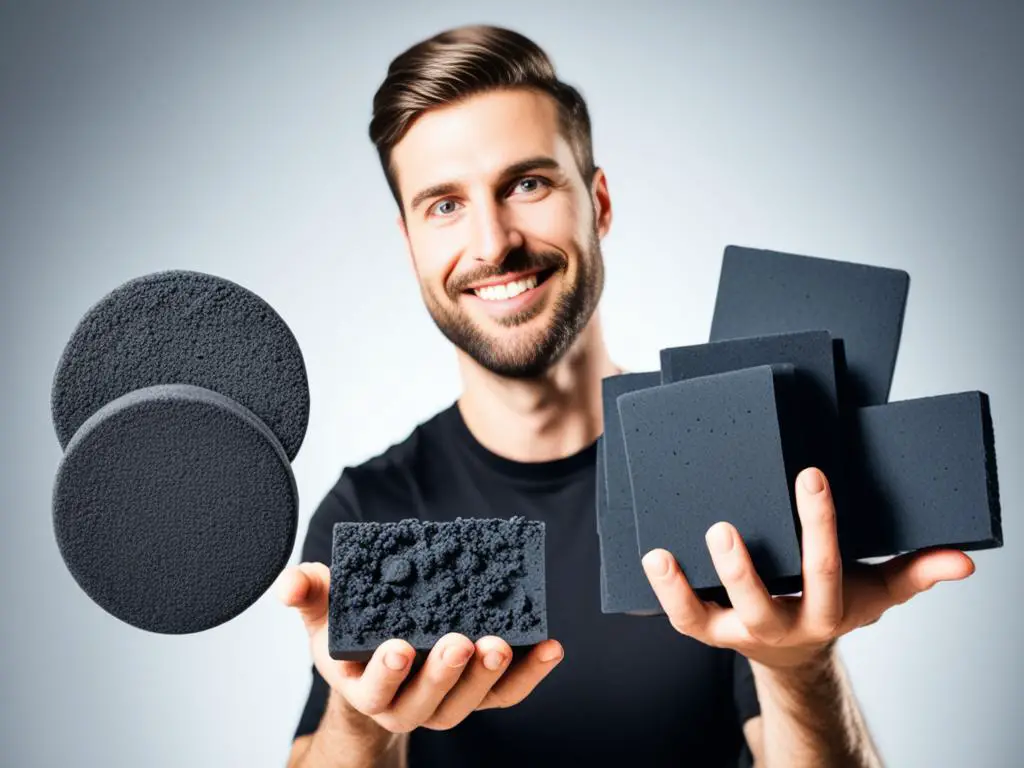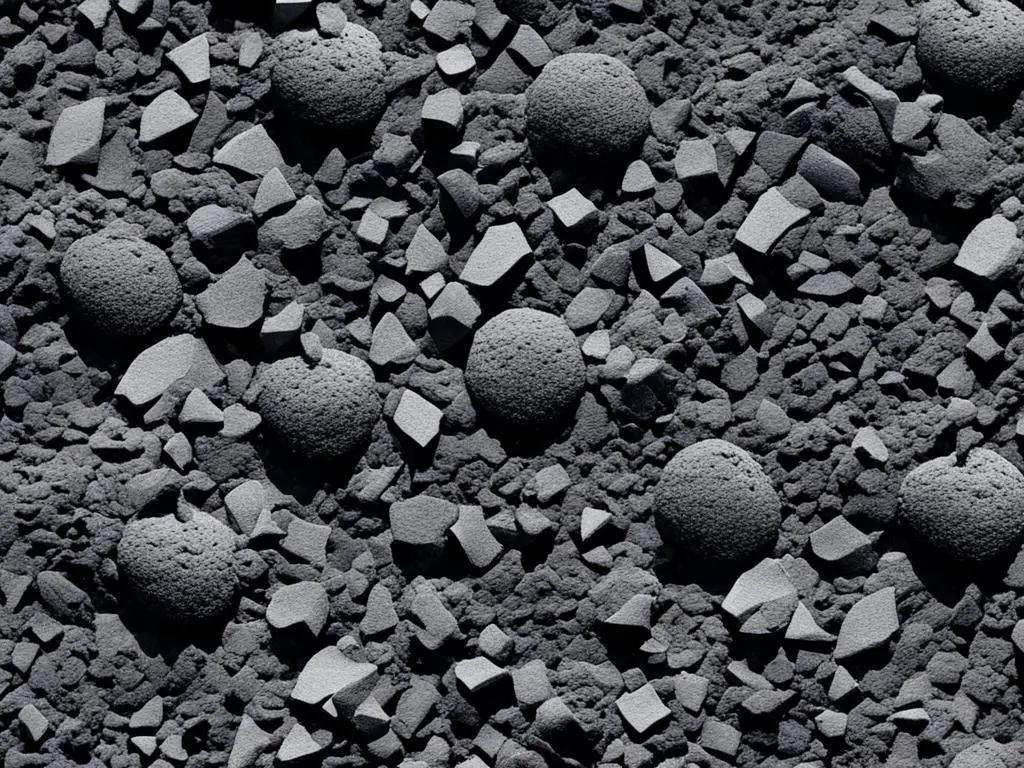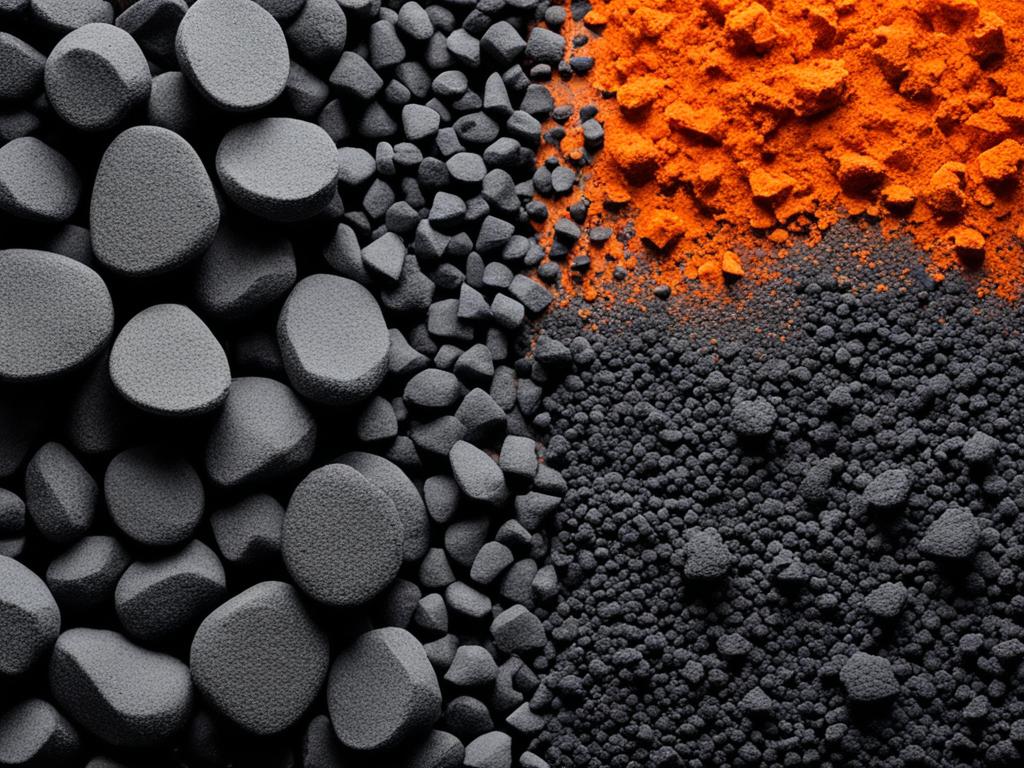Welcome to our article comparing volcanic rock and activated charcoal. These two substances have distinct properties and benefits that make them valuable in various applications. Whether you’re interested in their filtration capabilities or their skincare uses, understanding their properties can help you make informed decisions. So, let’s dive into the world of volcanic rock and activated charcoal!
Key Takeaways:
- Volcanic rock, specifically basalt, is abundant in volcanic islands like Hawaii and is known for its porous nature and natural water filtration properties.
- Activated charcoal is a form of charcoal that has been heated to increase its adsorptive power, making it widely used in water and air purification.
- Volcanic rock is often used in skincare products for exfoliation, as well as in landscaping and hardscaping projects for its durability and aesthetic appeal.
- Activated charcoal can remove toxins from water without stripping important minerals and is also utilized in detoxification treatments in medical settings.
- Basalt, a type of volcanic rock, has properties such as high porosity and erosion resistance, while activated charcoal has a high surface area and neutral pH.
Uses and Benefits of Volcanic Rock
Volcanic rock, also known as volcanic stone or lava rock, offers a multitude of uses and benefits across different industries. Its unique properties make it a versatile material that finds applications in skincare, water filtration, and landscaping projects.
Volcanic Rock for Skincare
In the realm of skincare, volcanic rock is often incorporated into exfoliating products due to its abrasive texture. The fine particles of volcanic rock help to gently remove dead skin cells, unclog pores, and promote a smoother and more rejuvenated complexion. Whether in the form of scrubs, masks, or cleansers, volcanic rock acts as a natural exfoliant that promotes healthier-looking skin.
Volcanic Rock Filtration
One of the notable uses of volcanic rock is its application in water filtration systems. The porous nature of volcanic rock allows it to accumulate a biofilm, which acts as a natural filter for bacteria and sediment. This filtration process helps to purify water and retain beneficial minerals, resulting in a unique alkaline taste. Volcanic rock filtration systems are commonly used in both residential and commercial settings, providing clean and mineral-rich water for various purposes.
Landscaping and Hardscaping
Beyond skincare and water filtration, volcanic rock also serves as a popular choice in landscaping and hardscaping projects. Its durability and aesthetic appeal make it an ideal material for pathways, driveways, and decorative elements in gardens and outdoor spaces. With its natural texture and earthy tones, volcanic rock adds a touch of rugged beauty to any landscape design.
In summary, volcanic rock offers a range of uses and benefits, from its role in skincare as an exfoliator to its applications in water filtration and landscaping. Its diverse qualities make it a valuable resource, harnessing the power of nature for various purposes.

Uses and Benefits of Activated Charcoal
Activated charcoal is a versatile substance with numerous uses and benefits across different industries. Its unique properties make it highly effective in various applications.
Water Filtration
One of the primary uses of activated charcoal is in water filtration systems. When used as a filter media, activated charcoal helps enhance the taste and odor of water. It effectively removes chemicals such as chlorine, impurities, and contaminants, resulting in cleaner and more palatable drinking water. The adsorptive power of activated charcoal allows it to trap and hold these substances, improving the overall quality of water.
Detoxification
Activated charcoal is well-known for its detoxification properties. In medical settings, it is used to treat drug overdoses and cases of poisoning. The activated charcoal absorbs toxins in the gastrointestinal tract, preventing their absorption into the bloodstream. This detoxifying effect helps mitigate the harmful effects of ingested substances and contributes to the successful treatment of poisoning incidents. Moreover, activated charcoal is used in various detoxification programs and supplements to support overall health and well-being.
Skincare
In addition to its applications in water filtration and detoxification, activated charcoal is widely used in skincare products. Its excellent absorption properties make it effective in removing excess oil, dirt, and impurities from the skin. Activated charcoal-based cleansers, masks, and scrubs help detoxify the skin, unclog pores, and promote a clearer complexion. The use of activated charcoal in skincare enhances the overall cleanliness and health of the skin.
With its wide range of uses and benefits, activated charcoal continues to be a valuable substance in various industries. Whether it’s improving water quality, supporting detoxification processes, or enhancing skincare routines, activated charcoal proves to be a versatile and effective solution.

| Benefits of Activated Charcoal | Uses of Activated Charcoal |
|---|---|
| Enhances the taste and odor of water | Water filtration |
| Adsorbs and removes impurities in water | Detoxification |
| Cleanses and clarifies the skin | Skincare |
Properties of Volcanic Rock and Activated Charcoal
Volcanic rock and activated charcoal possess distinct properties that make them valuable in various applications.
Firstly, volcanic rock, specifically basalt, is highly porous, allowing it to effectively filter water and retain moisture in gardening and landscaping projects. The porous nature of basalt enables the accumulation of biofilm, which acts as a natural filter for bacteria and sediment. Additionally, the durability and erosion resistance of basalt make it a suitable choice for long-lasting construction projects.
On the other hand, activated charcoal exhibits unique properties due to its activation process. With its high surface area, activated charcoal has exceptional adsorptive capabilities, effectively trapping impurities and contaminants. Furthermore, activated charcoal’s neutral pH ensures its safety for various applications. Its fine particles and porous structure make it an efficient filter media for water and air purification.
Comparison of Volcanic Rock and Activated Charcoal Properties
| Property | Volcanic Rock | Activated Charcoal |
|---|---|---|
| Porosity | Highly porous, enabling effective water filtration and moisture retention | Porous structure with a high surface area for excellent adsorption of impurities |
| Durability | Durable and resistant to erosion | N/A |
| pH Level | N/A | Neutral, ensuring safety for various applications |
| Usage | Water filtration, moisture retention in gardening and landscaping | Water and air purification, detoxification treatments |

Conclusion
In conclusion, the comparison between volcanic rock and activated charcoal highlights their distinct uses and benefits. Volcanic rock, such as basalt, is widely employed in water filtration systems and landscaping projects. Its porous nature enables natural water filtration, preserving essential minerals and resulting in a unique alkaline taste. Additionally, volcanic rock finds applications in skincare and hardscaping due to its exfoliating properties and durability.
On the other hand, activated charcoal is highly valuable in water and air purification, as well as detoxification treatments. Its adsorptive power effectively removes impurities, chemicals, and odors from water, improving taste and overall quality. In medical settings, activated charcoal is vital for mitigating drug overdoses and poisoning due to its ability to absorb toxins and prevent their absorption by the body. Furthermore, activated charcoal is used in skincare products for its detoxifying effects and oil-absorbing qualities.
Understanding the properties and applications of volcanic rock and activated charcoal empowers individuals to make informed decisions. Whether it’s achieving clean and mineral-rich water, enhancing skincare routines, or purifying air, these substances offer valuable solutions in various scenarios. By harnessing the unique benefits of volcanic rock and activated charcoal, individuals can optimize their use for both practical and wellness purposes.
FAQ
What are the benefits of volcanic rock?
Volcanic rock, specifically basalt, has various benefits. It is often used in exfoliating skincare products to remove dead skin cells and unclog pores. It is also utilized in water filtration systems for its natural filtration properties, retaining beneficial minerals and resulting in a unique alkaline taste. Additionally, volcanic rock is commonly used in landscaping projects due to its durability and aesthetic appeal.
How is activated charcoal beneficial?
Activated charcoal has multiple benefits in different industries. In water filtration, it improves the taste and odor of water by removing chemicals like chlorine. It is also known for its detoxification properties and is used in medical settings to treat drug overdoses and poisoning. Activated charcoal is used in skincare products to remove excess oil and impurities from the skin, helping detoxify and clarify the complexion.
What are the properties of volcanic rock?
Volcanic rock, specifically basalt, is highly porous, allowing for effective water filtration and moisture retention in gardening and landscaping applications. It is also durable and resistant to erosion, making it suitable for long-lasting construction projects.
What are the properties of activated charcoal?
Activated charcoal has a high surface area, enabling better adsorption of impurities. It has a neutral pH, making it safe for use in various applications. Its fine particles and porous structure make it an effective filter media for water and air purification.
How is volcanic rock used in skincare?
Volcanic rock is used in exfoliating products due to its abrasive texture. It helps remove dead skin cells and unclog pores, leaving the skin smooth and rejuvenated.
In what industries is activated charcoal commonly used?
Activated charcoal is commonly used in water and air purification, as well as in medical treatments for detoxification purposes. It is also used in skincare products.



